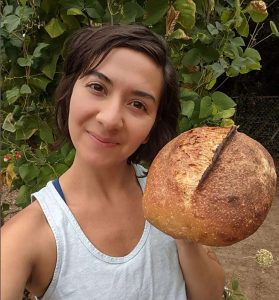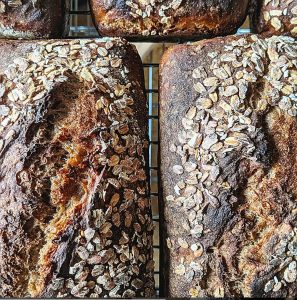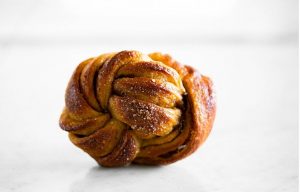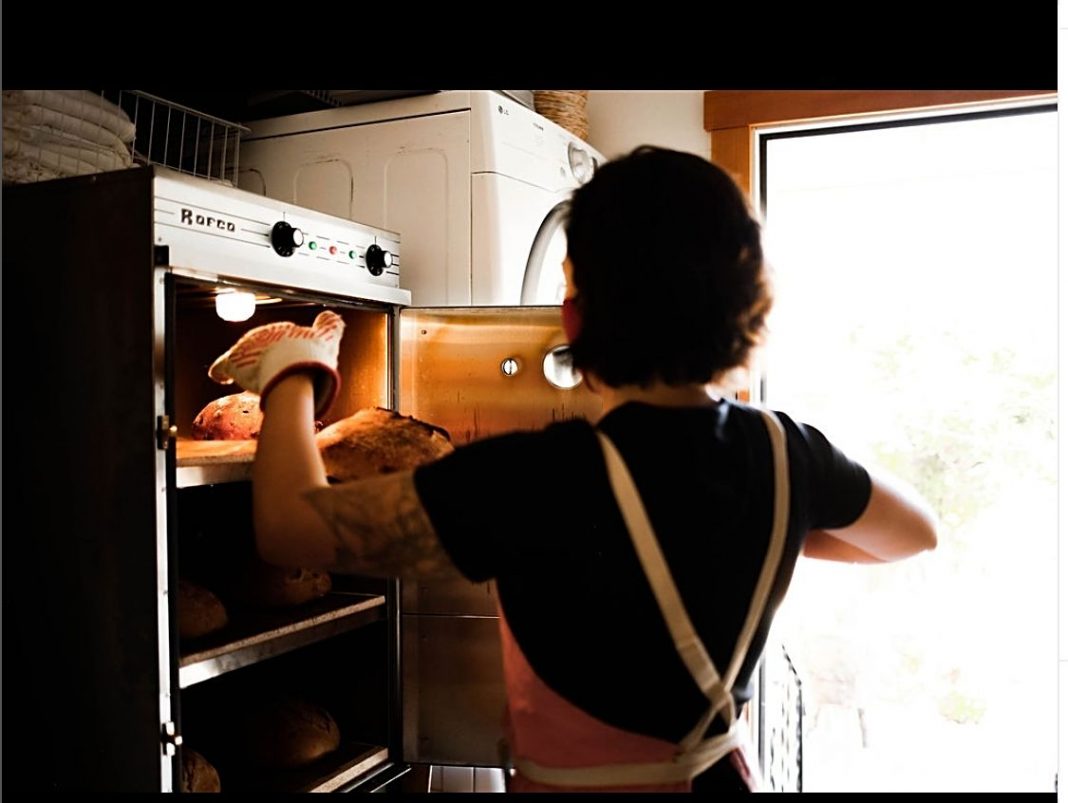Food is a necessary part of people’s everyday lives, and bread is often at the core. As a community baker, Meg Chernoff of Folk Bread plays a vital role in getting this nourishing pantry staple from its farmer and miller beginnings to her oven and on to local dinner tables. Since October 2020, Chernoff has been running the home-based baking business in her West Olympia neighborhood. She puts whole grain loaves and dessert treats in the hands of customers as early as the day they are made.

A full-time baker and a full-time mother, Chernoff’s baking background emanates from both her family and a love of making food. She baked with her grandmother and with her dad. In 2016, she started baking bread for herself and learning more from the internet. Online, she learned of a North Carolina sourdough baker who held workshops. Off she flew one weekend, across the country, to participate in the workshop. “A lot that I learned from her about where flour comes from, where grain comes from, how to work with your ingredients, really clicked with me,” shares Chernoff. “That started me on finding my own way once I came back home.” Now, she runs a cottage food business. The certification allows her to sustain a community supported model in which she utilizes her home kitchen, raises her family and provides a nutritious service to the community.
Similar to a community supported agriculture (CSA), Chernoff’s CSB, or community supported bread, operates on a subscription basis. Customers sign up ahead of time, choosing a season or month to month subscription, tuning in to her Monday newsletter and Instagram posting to see the week’s menu. Maybe it includes a cherry walnut sourdough to accompany a dinner and a rye cocoa brownie for dessert. By Tuesday evening, she has her orders lined up. Wednesday, she mixes dough in a mixer that can handle 25 loaves worth of dough at a time. On baking day, Thursday, she shapes each loaf and preps it for baking, which happens in a baking oven large enough for 12 loaves. She bakes an average of about 25 to 30 loaves each week.

When customers begin arriving Thursday afternoon, they follow a lighted path to the bread shed and open its doors to find paper bags labeled with their name. Depending on the week’s menu, the bags in the bread shed may contain loaves of rye bread, seeded sourdough, honey and olive oil bread, whole wheat loaves and barley porridge bread. If customers ordered the week’s dessert, the bag may also contain treats such as rosemary sea salt muffins, pecan bars, barley chocolate chunk cookies, cardamom buns or oat cookies.
Chernoff’s ingredients are whole grain and sourced from Pacific Northwest growers and ground by a regional miller. When she attended the Cascadia Grain Conference at South Puget Sound Community College, she networked about baking and graining with the Portland Whole Grain Bakers Guild, from whom she gets her flour. It enables her to buy flour from small farms in Oregon and Washington, anywhere from the Palouse to the Willamette Valley to the Olympic Peninsula. “The approach that I take, is when I say, ‘community supported bread,’ I really mean community. I use the CSB model not only to support myself and make my business sustainable because I know the customer base I can count on, and my customers can count on me. I really take seriously the work of being a middle person in the regional grain economy. There are people growing grains in our regional agriculture, and there are people milling those grains into flour in our agriculture, but they are often not making it to the end consumer and the person who is eating them. I really love being the baker that can introduce people to local wheat and local rye and show people that heirloom tomatoes are incredible and heirloom wheat is incredible too.”

Whole grains are a healthy choice. Refined grains do not have their outer bran or inner germ, which can be removed in the milling process to affect the texture and shelf life of bread. Unfortunately, the loss of the bran and germ mean the loss of important nutrients. “It’s my goal to make bread that is whole grain and is from regional grains but also that you really want to eat,” says Chernoff. “It’s delicious. It’s the bread you really want to eat because it tastes good.” In addition to using whole grains, she uses natural fermentation rather than commercial yeasts. “I make everything sourdough, so it’s fermented food that is much more digestible by most people’s bodies than commercial yeast.”
Subscribers reap the health benefits of good tasting bread, and it is also available to people who may not be able to pay. Subscribers can choose a pay it forward option with their monthly membership, allowing Chernoff to offer zero-cost memberships to anyone in need for whom cost is a barrier. It is one more way she plays a role in connecting people to good food.
Picking up orders is convenient at both an East Olympia and West Side location. Check out the Folk Bread website and Instagram to see mouthwatering photos of bread and treats and to sign up for the newsletter.



















































